What are the top 10 apps to use to build AI Coach?
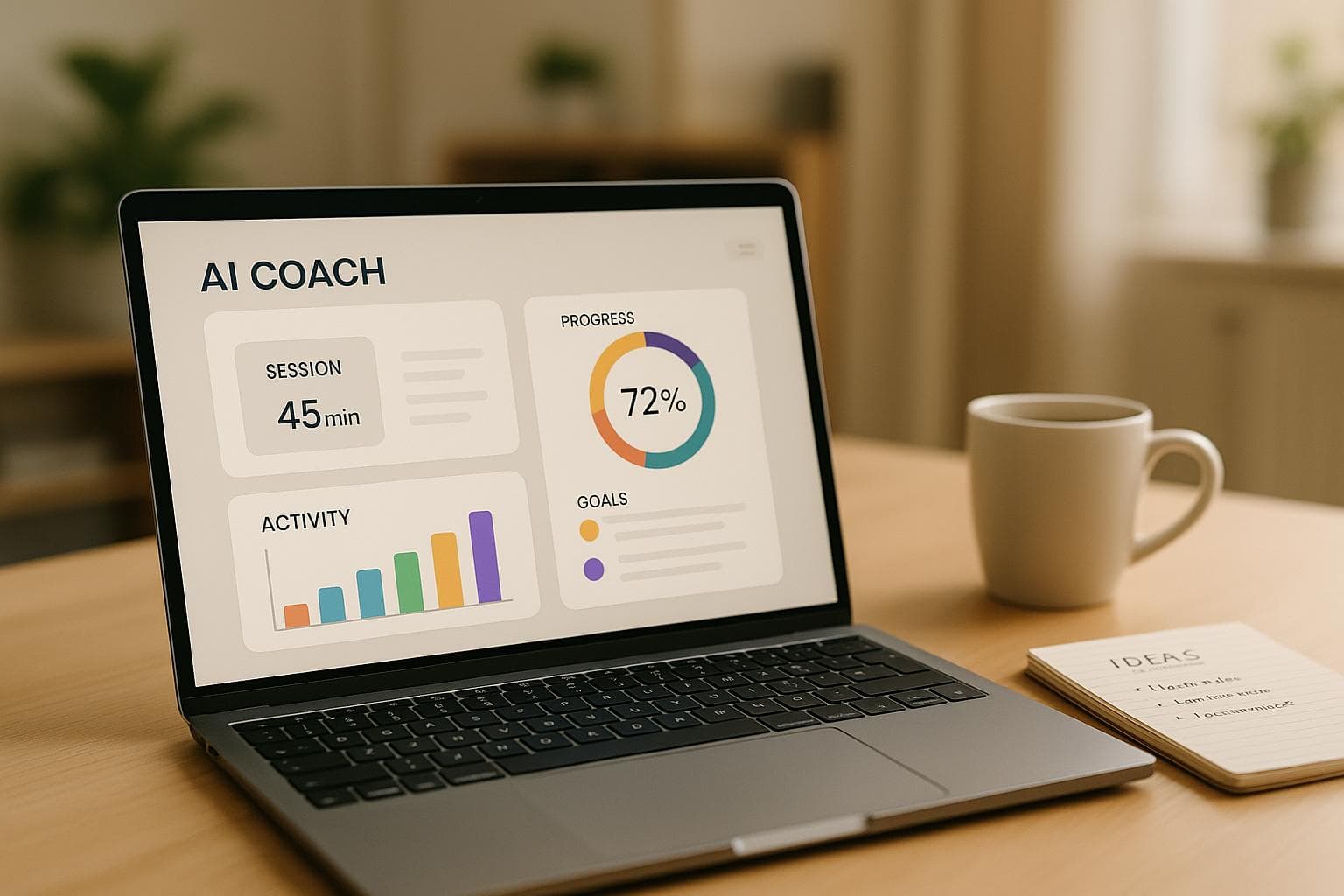
What are the top 10 apps to use to build AI Coach?
Building an AI coach has never been easier thanks to no-code platforms that simplify the process for professionals without technical expertise. Whether you're a fitness trainer, business consultant, or educator, these tools allow you to create personalized AI assistants to engage with clients, track progress, and provide tailored advice. Here's a quick rundown of the top 10 apps to help you design your AI coach:
- OpenAssistantGPT: A no-code chatbot builder with web crawling, file analysis, and integration capabilities. Plans start at $0/month.
- Voiceflow: A visual platform for creating text, voice, and multimodal AI assistants with ready-made templates and integrations.
- AgentHeroes: Offers visual AI characters and multimedia content automation for engaging coaching experiences.
- ChatGPT UI: Simplifies AI assistant creation with drag-and-drop tools, custom branding, and multi-channel deployment.
- Open Custom GPT: Allows easy customization of AI conversational flows tailored to your coaching style.
- ColossalChat: Provides a foundation for creating conversational AI tools but requires reviewing its documentation for specifics.
- OpenChatKit: An open-source toolkit for building conversational AI assistants with customization and integration options.
- OPT Language Models: Meta's pre-trained models that support fine-tuning for personalized AI coaching applications.
- Agentive: No longer operational but previously offered AI-driven solutions.
- Repo2txt: Converts code repositories into text for creating training datasets for AI models.
These tools cater to different needs, from simple setups to advanced customization and integrations. Choose one based on your technical skills, budget, and the type of coaching experience you want to deliver.
How to Build AI Chatbots: Full Guide (2025 Updates, Agents & Free Templates)
1. OpenAssistantGPT
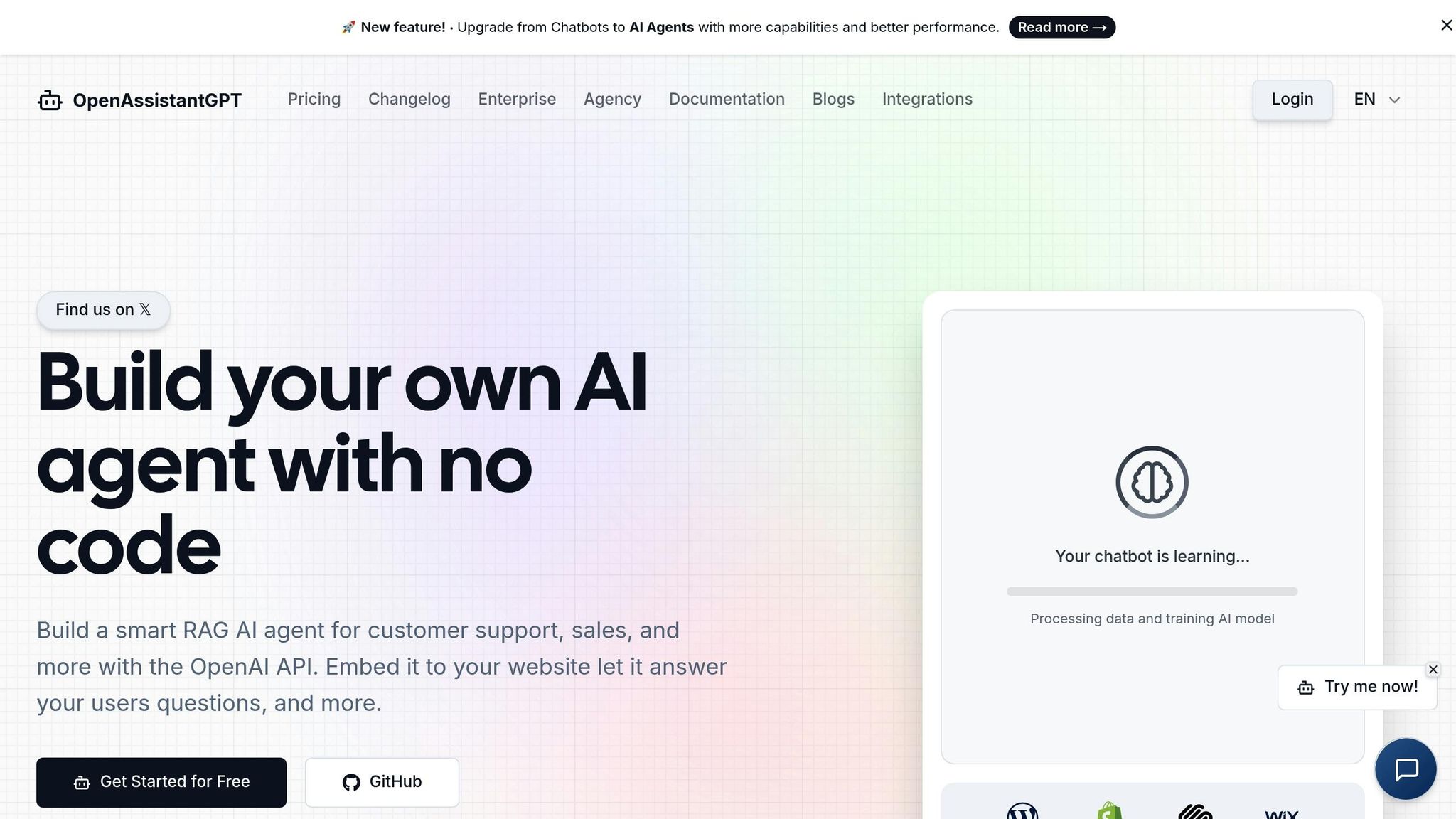
OpenAssistantGPT is a platform designed to simplify the creation of AI-powered chatbots, specifically tailored to function as intelligent coaching assistants. Founded by Marc-Olivier Bouchard, this platform uses OpenAI's Assistant API to deliver engaging and interactive conversational experiences.
No-code capabilities
With its user-friendly drag-and-drop interface, OpenAssistantGPT is accessible to business owners, trainers, and consultants, even those without technical expertise. It supports the latest OpenAI models, including GPT-4, GPT-3.5, GPT-4o, and the anticipated GPT-5.
One of its most impressive features is the ability to perform web crawling. This allows the AI coach to gather and learn from content on your website or other online sources. For instance, a fitness coach could have their assistant pull insights from blog posts about nutrition, exercise routines, or client success stories.
The platform also supports file upload analysis. Coaches can provide documents like CSV files, XML data, or images, and the AI can use this information to offer tailored advice. These features make it possible to create a highly personalized coaching experience.
Customization options
OpenAssistantGPT allows users to fully adapt their AI coach to reflect their brand and coaching style. You can tweak the chatbot's appearance, adjust conversation flows, and refine its responses to align with your unique methodology.
The platform also includes tools for lead collection, automatically capturing user information during interactions. This feature can help turn casual visitors into potential clients. Additionally, customizable disclaimers let users set clear boundaries about what the AI coach can and cannot do, ensuring transparency.
Integration with APIs and tools
OpenAssistantGPT takes functionality a step further with its AI Agent Actions feature. This enables your chatbot to interact with external APIs and third-party tools. Whether it’s pulling real-time data, accessing scheduling systems, or connecting with fitness tracking apps, your AI coach can offer more personalized and relevant guidance.
The platform’s web search functionality ensures that your AI coach stays updated with the latest information, providing users with current and accurate advice.
For developers, OpenAssistantGPT offers an open-source SDK compatible with NextJS and Vercel, giving them the flexibility to create custom chatbot deployments.
Scalability for deployment
Whether you’re working on a small personal project or managing large-scale enterprise operations, OpenAssistantGPT has options to suit your needs. It supports SAML/SSO authentication for private chatbots, making it ideal for exclusive membership sites or enterprise coaching programs.
The pricing plans are designed to grow with you. There’s a free plan offering 500 messages per month, a Basic plan at $18/month (up to 9 chatbots), and a Pro plan at $54/month (27 chatbots with advanced features). This range of options makes it a practical solution for both individual coaches juggling multiple clients and agencies managing larger coaching programs.
2. Voiceflow
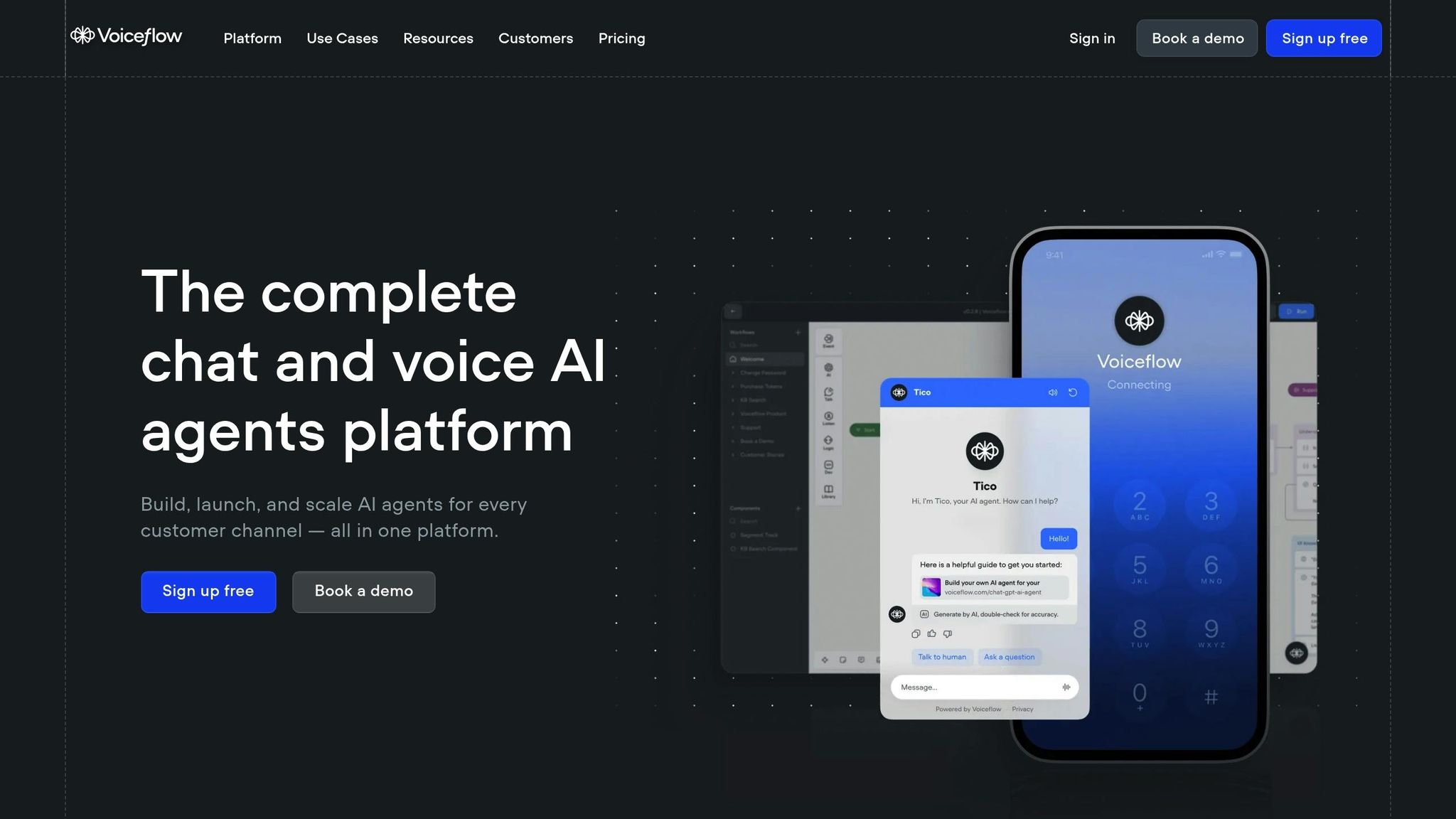
Voiceflow is a user-friendly platform designed to simplify the process of creating and launching AI coaching assistants. With its visual interface and robust backend tools, it caters to both beginners and seasoned developers aiming to design engaging coaching experiences.
No-Code Development Made Simple
Voiceflow makes developing AI coaches straightforward with its drag-and-drop interface and pre-designed conversation blocks. Its library of templates includes ready-to-use frameworks for common coaching scenarios like goal setting, progress tracking, and motivational check-ins. These templates can be easily adjusted to match your personal coaching style.
The platform also supports multi-modal interactions, allowing your AI coach to communicate through text, voice, and even visual elements. This versatility ensures the coaching experience can adapt to different user preferences and communication styles.
On top of its ease of use, Voiceflow provides tools for fine-tuning every aspect of your AI coach to reflect your unique coaching approach.
Tailored Customization
Voiceflow gives you the ability to personalize your AI assistant's tone, response style, and conversation flow. Its variable system stores user preferences and progress, ensuring interactions feel more personal. Additionally, conditional logic blocks allow you to create dynamic conversation paths that respond to user inputs in real time.
Seamless Integrations
Voiceflow integrates easily with APIs, webhooks, and various tools, connecting your AI coach to apps like productivity trackers, fitness devices, and CRM platforms. It also includes built-in analytics to help you understand user engagement and improve conversation performance. These features make it possible to create a coaching assistant that works across multiple platforms.
Ready for Multi-Channel Deployment
Voiceflow supports deployment across a variety of channels, including websites, mobile apps, voice assistants, and messaging platforms. This ensures your AI coach can reach users wherever they prefer to interact, making it a scalable solution for diverse audiences.
3. AgentHeroes
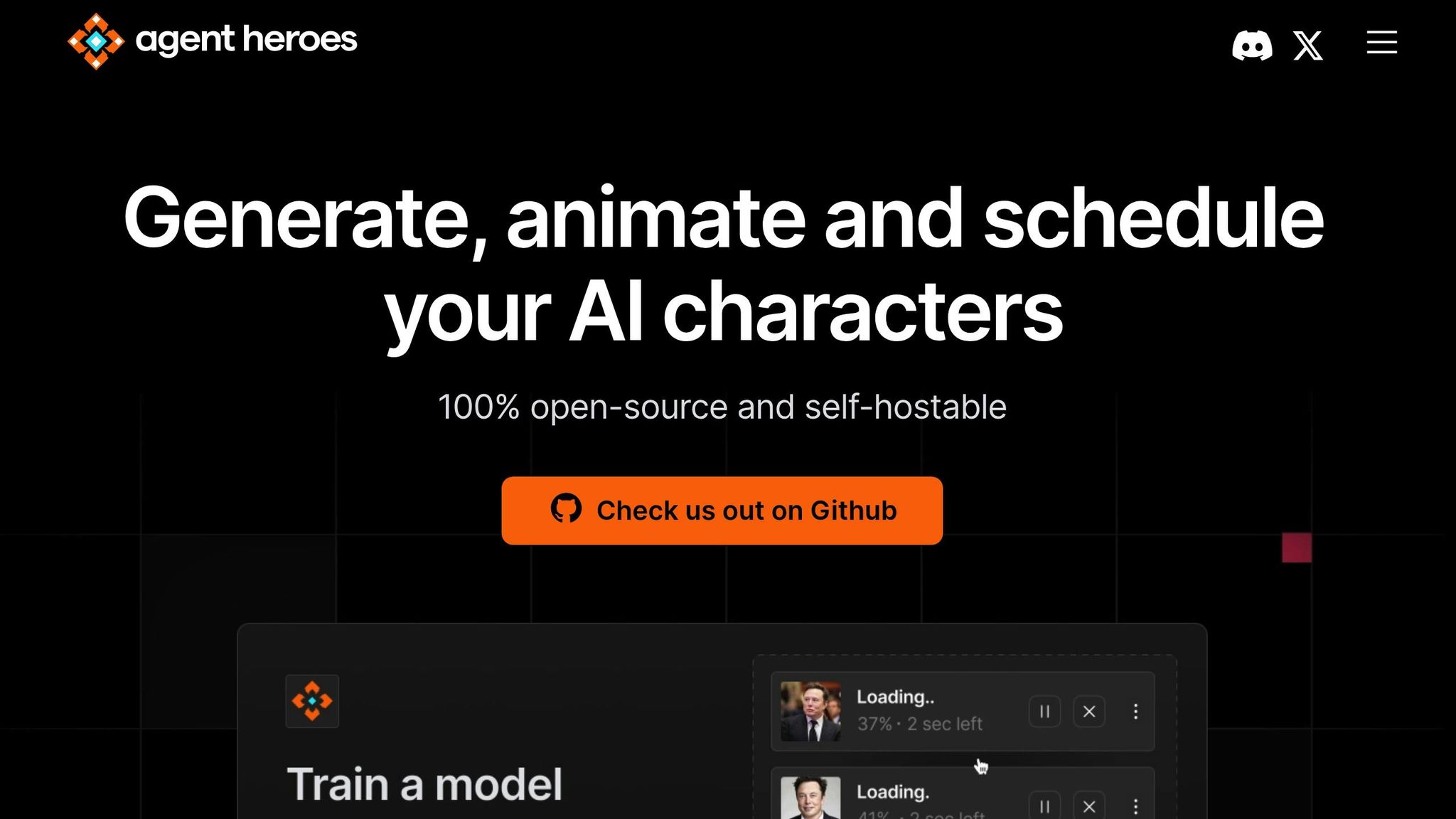
AgentHeroes is a platform designed to help coaches create AI-powered assistants that deliver personalized and engaging coaching experiences. By leveraging automated workflows triggered through APIs, coaches can use visual AI characters to present content in a variety of formats. This setup integrates effortlessly with modern API systems, similar to those found on other popular platforms.
Visual Character Creation
With AgentHeroes, creating and animating AI characters is straightforward. These characters can act as the "face" of your coaching practice. By training LoRA models on specific images, you can design custom avatars that align with your brand or coaching style. These avatars can then be animated to share motivational messages, track progress, or deliver educational material in an engaging way.
Integration with APIs and Tools
AgentHeroes works seamlessly with established AI model training services to enhance the capabilities of your AI coach. Some key features include:
- Training LoRA models on images to create custom visuals.
- Generating images using trained or alternative AI models.
- Converting those images into videos.
- Scheduling and publishing the videos on platforms like X.
The platform’s API-driven approach allows for smooth integration with various AI models and external tools, simplifying processes without requiring extensive coding knowledge.
Scalability for Deployment
AgentHeroes takes the hassle out of managing coaching workflows by automating the creation and scheduling of multimedia content. This enables coaches to efficiently deliver content while scaling their practice with ease.
4. ChatGPT UI
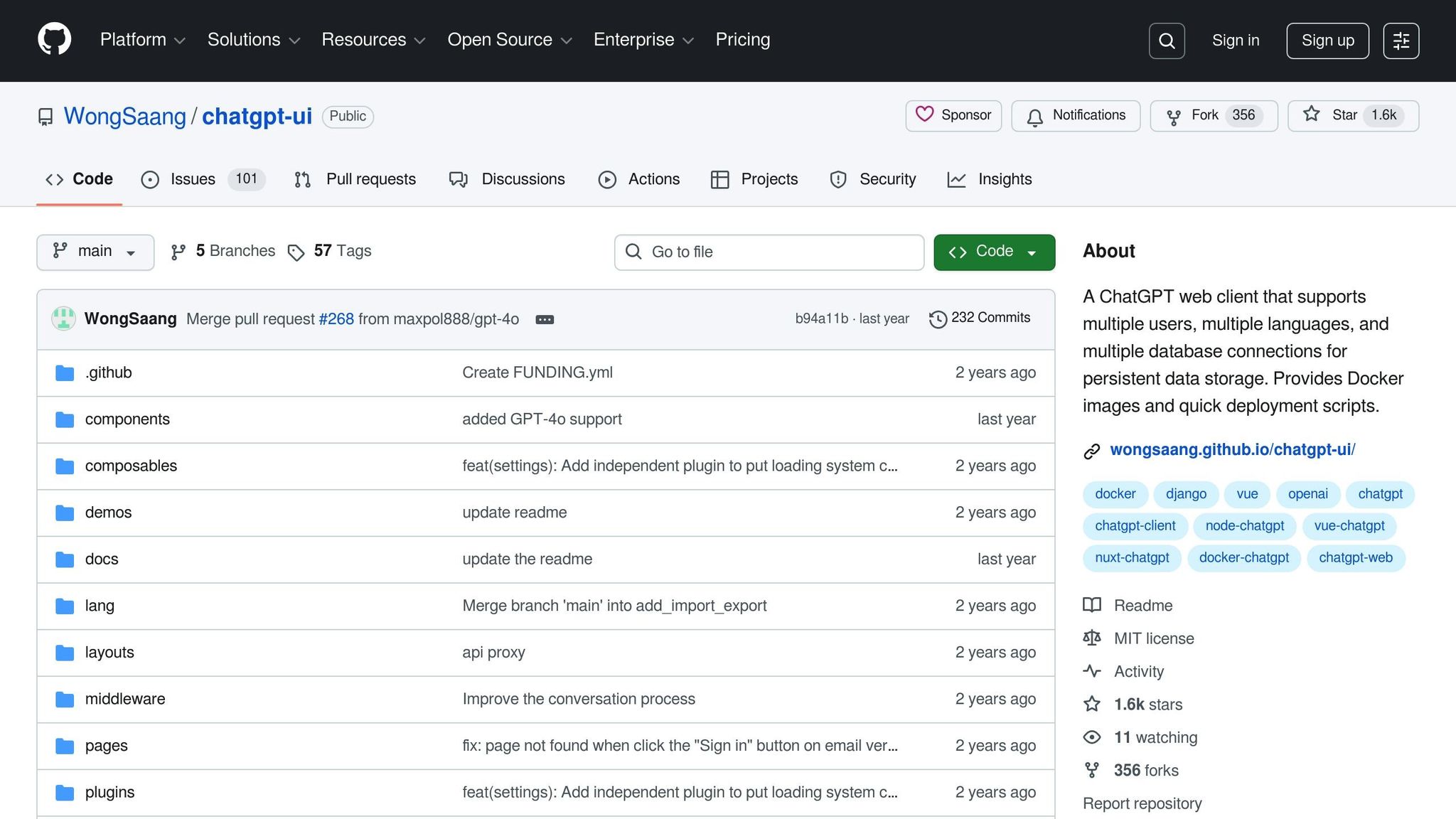
ChatGPT UI is part of the growing wave of platforms making AI coaching tools more accessible. Designed with simplicity in mind, this no-code platform enables coaches to build and customize AI-driven applications without needing a technical background.
Intuitive Interface Design
The platform features a drag-and-drop interface that simplifies customization. Coaches can tweak interaction flows, adjust response styles, and even integrate external APIs without hassle. Pre-built conversation templates tailored to coaching needs - like goal setting, accountability check-ins, and progress tracking - help users quickly set up meaningful coaching dialogues.
Customization and Personalization Features
ChatGPT UI goes a step further by allowing coaches to personalize the AI assistant’s personality, tone, and expertise to align with their coaching methods. It also supports custom branding, so users can incorporate their logos, colors, and messaging for a seamless client experience. With variable tracking, the platform ensures the AI remembers user preferences and tracks progress across sessions, adding a personal touch to every interaction.
Integration Capabilities
Seamless integration is another highlight of ChatGPT UI. The platform connects with popular tools like scheduling systems, productivity apps, and analytics platforms via webhooks. This makes it easy for coaches to sync client data, automate follow-ups, and monitor engagement - all within their existing workflows.
Deployment and Scalability
With support for multi-channel deployment, ChatGPT UI allows coaches to embed AI assistants on websites, mobile apps, and messaging platforms. Its scalable infrastructure caters to both solo practitioners and large enterprises, making it a versatile option for a wide range of coaching needs. This platform is helping redefine how coaches nationwide approach AI-driven solutions.
5. Open Custom GPT
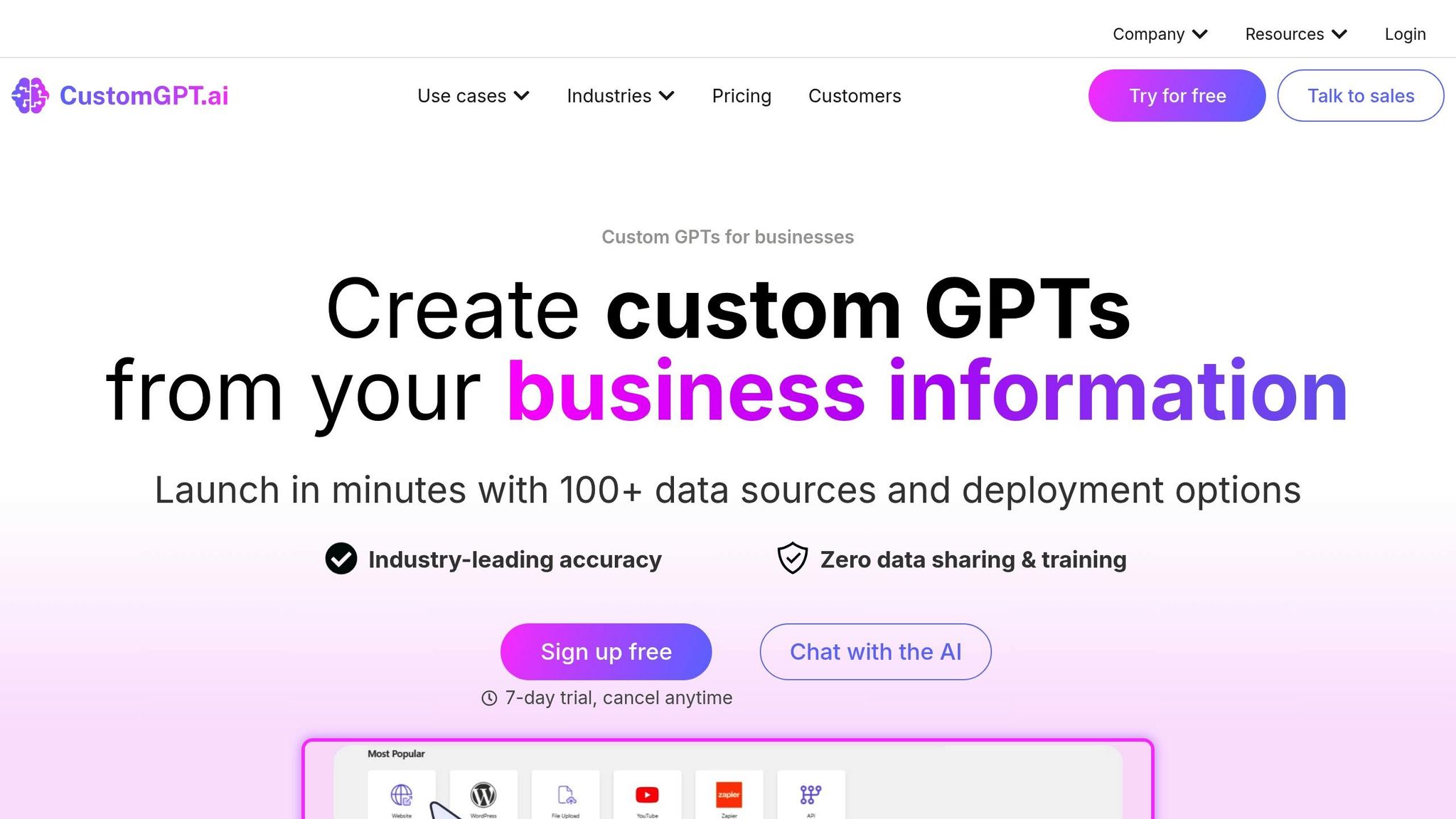
Open Custom GPT gives coaches the ability to design AI coaching assistants tailored specifically to meet their clients' unique needs. With its user-friendly, no-code platform, coaches can effortlessly create and adjust conversational flows that align with their personal coaching style. Whether it’s fine-tuning the tone, crafting specific responses, or curating content, this tool makes personalization straightforward and effective. It’s a practical way to integrate AI into coaching without getting bogged down in technical complexities.
Much like other top-tier tools, Open Custom GPT makes AI coaching accessible to professionals who might not have a technical background. It allows coaches to incorporate their own materials and communication preferences, ensuring the assistant mirrors their unique approach and methodology.
Integration and Deployment
Open Custom GPT works seamlessly with external tools, simplifying coaching workflows. It can be deployed across websites, mobile platforms, and other channels, ensuring the AI assistant is always within reach. This flexibility makes it a valuable resource for coaches who want to integrate AI into their practice while staying true to their personal coaching style and client engagement techniques.
6. ColossalChat
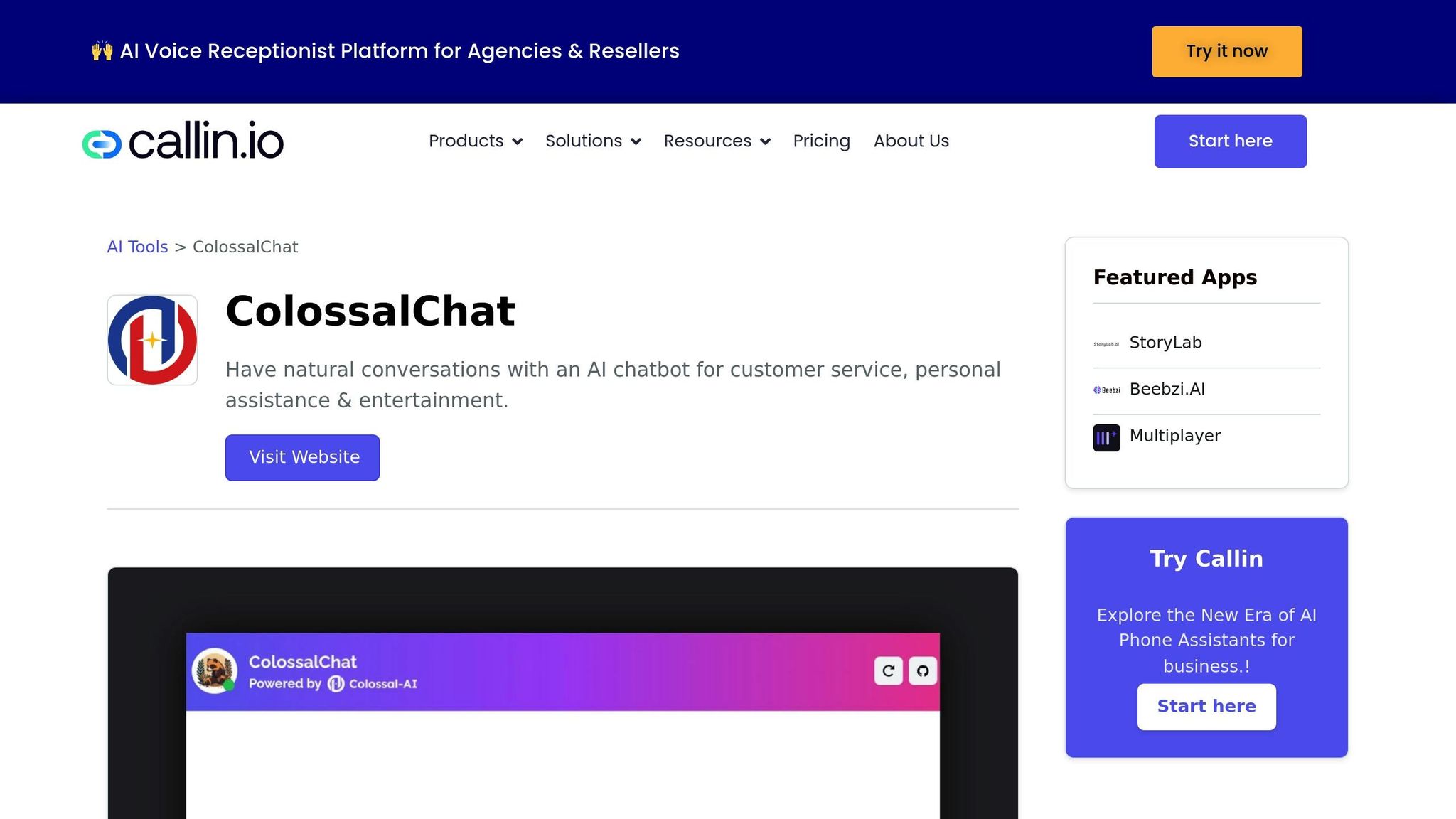
In the realm of platforms designed for creating AI coaching assistants, ColossalChat stands out as an option worth considering. While its public documentation doesn't dive deeply into specifics regarding customization or scalability, it offers a foundation for building AI-driven coaching tools. For a more thorough understanding of its features and capabilities, checking the official documentation is essential.
Up next, we'll take a look at other solutions that expand the possibilities of AI coaching assistants.
sbb-itb-7a6b5a0
7. OpenChatKit
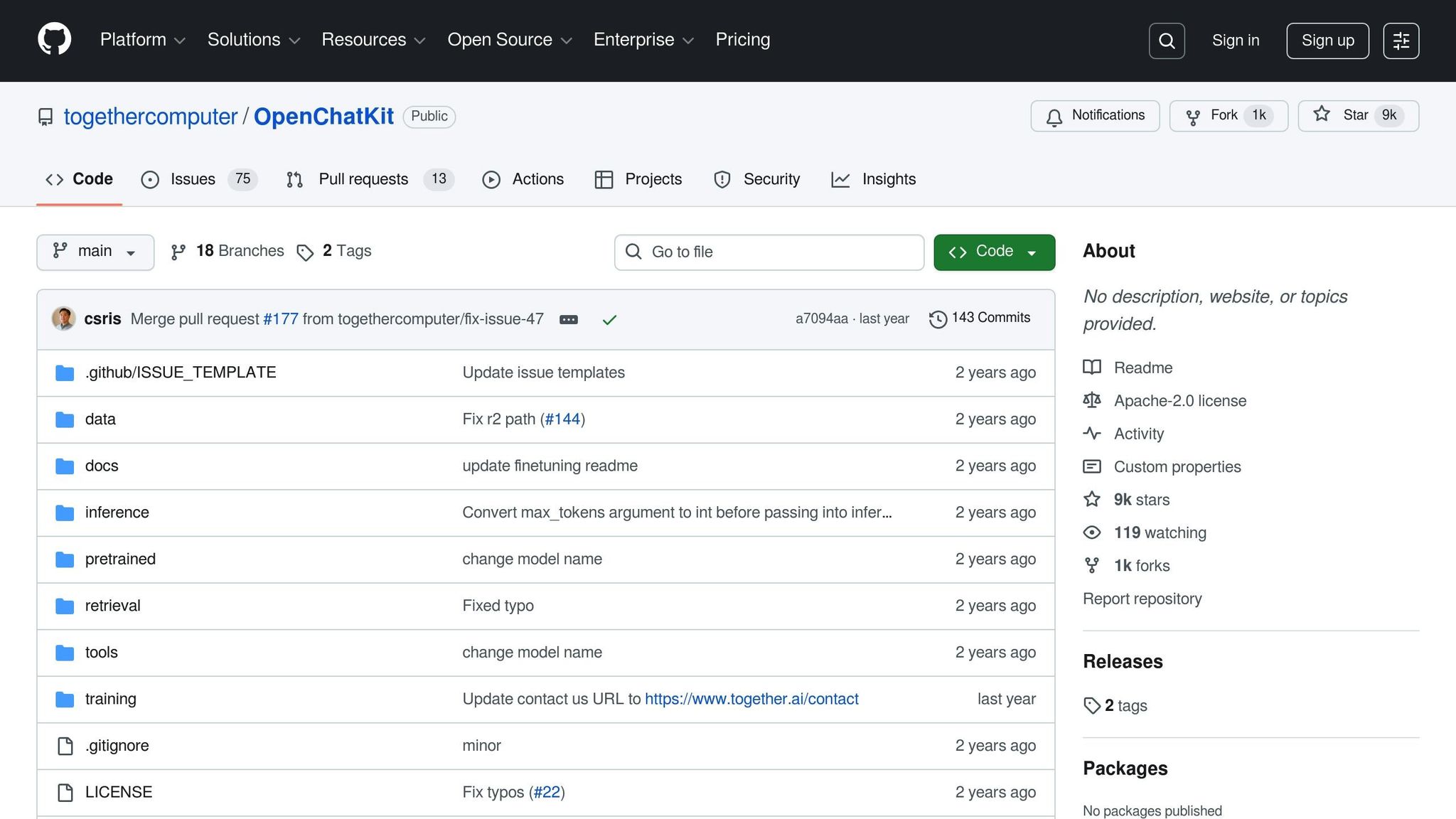
OpenChatKit is an open-source toolkit designed to simplify the creation of conversational AI applications, particularly for coaching purposes. With its customizable features, easy integration, and lightweight design, it allows developers to quickly roll out coaching assistants across different platforms.
Being open-source, OpenChatKit thrives on community contributions, ensuring constant updates and the ability to fine-tune it to match your brand's specific needs. In the next section, we’ll dive into how this toolkit works alongside other tools to build advanced AI coaching systems.
8. OPT Language Models
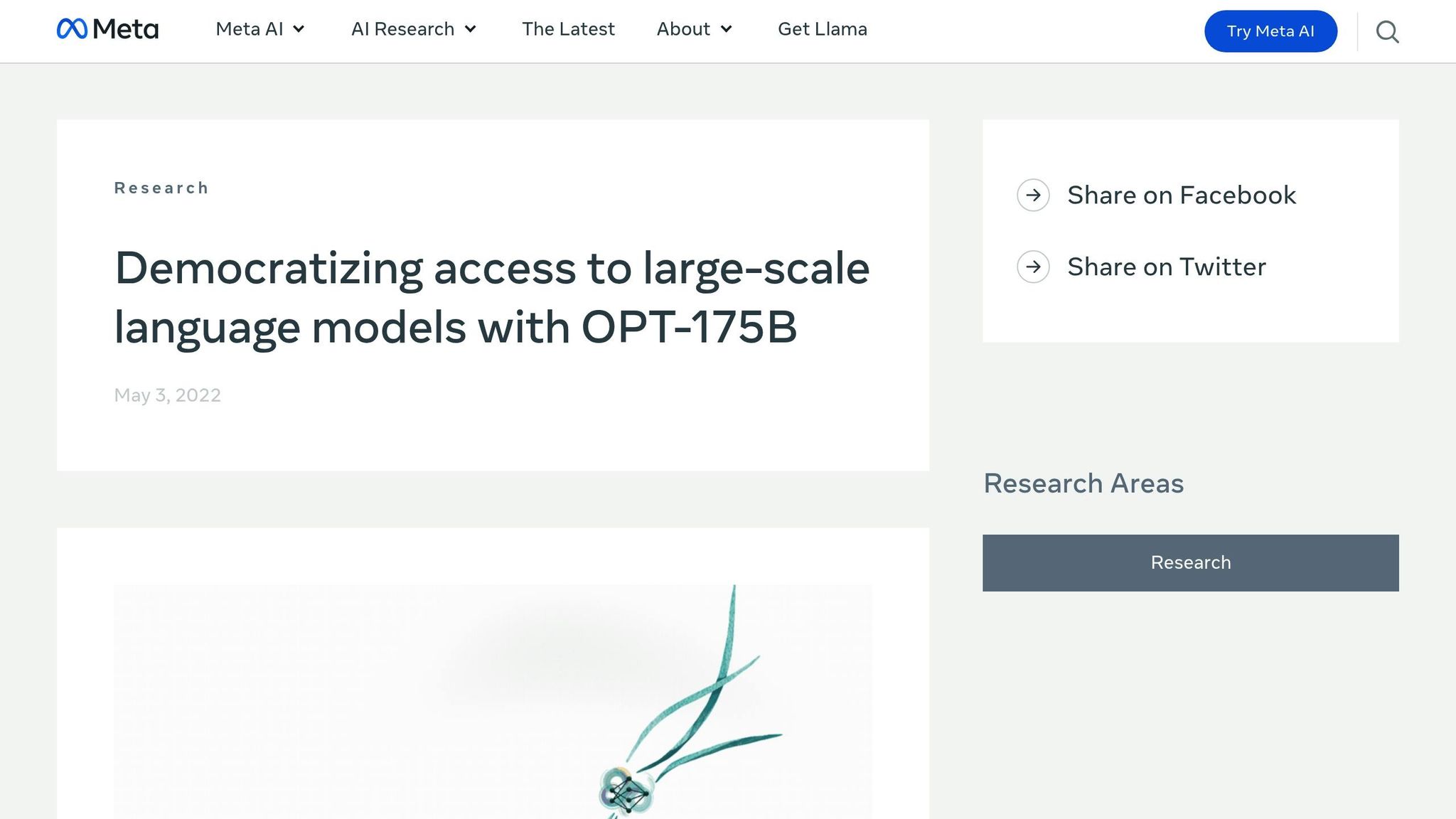
OPT (Open Pre-trained Transformer) Language Models, created by Meta, serve as a solid foundation for building conversational AI applications. As open-source pre-trained models, OPT is designed to support developers in creating AI coaches that can engage in meaningful and dynamic conversations. This foundation allows for flexibility and customization, making it a reliable choice for developers aiming to craft personalized AI solutions.
Customization Options
OPT models can be fine-tuned using specific coaching datasets, enabling developers to align the AI's communication style and methodology with their unique goals.
Integration with APIs and Tools
These models are compatible with standard APIs and development frameworks, making it easier to embed them into larger platforms. Whether you’re handling user management, scheduling, or other system functionalities, OPT models integrate smoothly into your existing infrastructure.
Scalability for Deployment
OPT models can be deployed on both cloud-based and on-premises systems, allowing them to scale effectively as your user base expands. Whether you're starting small or planning for rapid growth, these models adapt to your deployment needs.
9. Agentive
Agentive has shut down operations and is no longer an option for developing new AI coach projects.
Integration with APIs and Tools
If your business requires help with building, integrating, or managing AI or software solutions, you can check out morningside.ai for support.
Up next, we’ll dive into Repo2txt, a tool designed to enhance AI coach functionalities.
10. Repo2txt
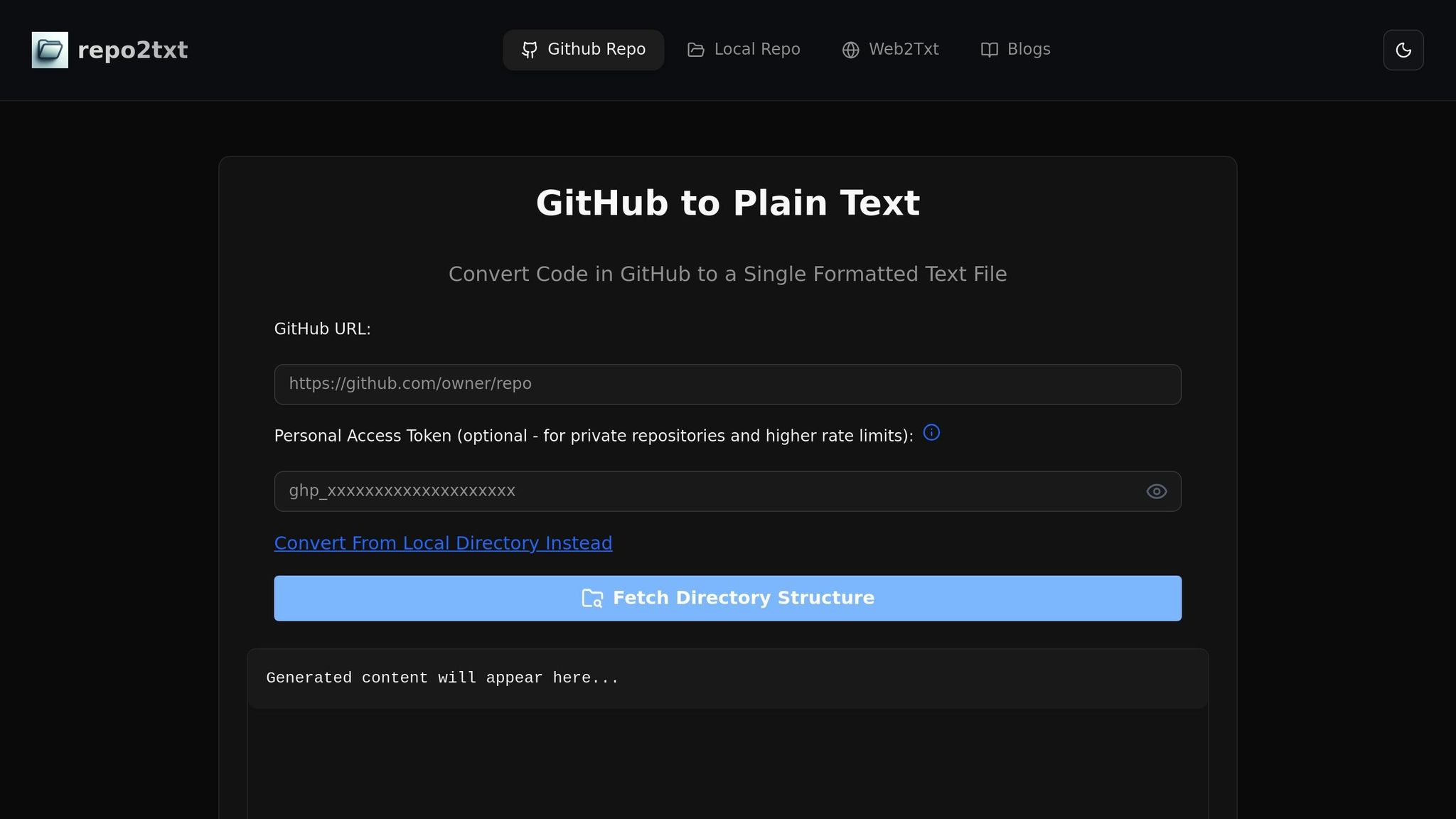
Repo2txt is a tool designed to turn code repositories into text, making it easier to create datasets for training AI coach models. By analyzing repository documentation, it transforms codebases into useful text-based training materials.
Feature Comparison Table
Here's a quick breakdown of OpenAssistantGPT's features, benefits, limitations, and pricing:
| Platform | Key Features | Main Benefits | Potential Drawbacks | Pricing Range |
|---|---|---|---|---|
| OpenAssistantGPT | No-code chatbot builder; integration with OpenAI's Assistant API; web crawling; SAML/SSO authentication; lead collection; file analysis | Simple, code-free setup; unlimited messages on paid plans; highly customizable; enterprise-level security | Free plan limits you to 1 chatbot with 500 messages per month; extra costs for OpenAI API usage may apply | $0 – $54/month |
Evaluate your technical requirements, budget, and specific goals to decide if OpenAssistantGPT aligns with your needs.
Conclusion
Creating an AI coach is now within reach for anyone, thanks to no-code platforms that eliminate the need for technical expertise. Whether you're a small business owner, educator, or leading an enterprise, these tools allow you to design advanced coaching solutions without touching a single line of code.
When choosing the best platform for your AI coach, it’s essential to weigh a few key factors. Look for features that offer personalization and practical learning methods - like customized responses, simulated conversations, and role-playing with instant feedback. For larger organizations, structured coaching frameworks and tools for tracking outcomes are critical. Be sure to prioritize robust security measures (such as GDPR and CCPA compliance, encryption, and model isolation), multilingual capabilities, and integrations with systems like HRIS, LMS, SSO, and calendars to streamline operations. You might also consider a hybrid model that combines AI with certified human coaches to handle more nuanced or complex topics.
Before committing to a platform, outline your goals, budget, and technical requirements. Take advantage of free trials or plans to test the user experience and the range of features. For example, OpenAssistantGPT offers a free plan that includes one chatbot with 500 messages per month. This can be an excellent way to explore AI coaching capabilities before upgrading to paid plans, which range from $18 to $54 per month. This step-by-step approach helps ensure your AI coach is tailored to your specific needs.
AI is shaping the future of coaching - making it more accessible and customizable than ever.
FAQs
How can I select the best app to build an AI coach based on my skills and budget?
Choosing the right app to create an AI coach largely depends on your skill level and budget. If coding isn’t your strong suit or you’re just starting out with app development, no-code or low-code platforms are a great option. These tools often come with user-friendly interfaces that let you design a functional AI coach without needing to dive into complex programming.
On the other hand, if you have solid technical expertise, you might prefer platforms that allow custom development. These options give you more room to tailor the app to your specific needs and potentially scale it over time. Don’t forget to factor in your budget - some platforms offer free or budget-friendly plans, while others might require a bigger financial commitment for advanced features or extensive customization. The key is finding the right balance between functionality, ease of use, and cost to align with your goals.
What should I look for in a no-code platform to build an AI coaching assistant?
When selecting a no-code platform to build an AI coaching assistant, focus on features that simplify the process while allowing room for growth. A platform with visual workflow designers can help you easily map out your AI's logic without needing to write code. Similarly, tools offering pre-trained models can save you time by providing ready-to-use AI functionalities, and data connectors ensure smooth integration with your existing data sources.
It’s also worth considering platforms that include automated machine learning (AutoML) to simplify the training process and real-time deployment capabilities for quicker implementation. These features make it easier for non-technical users to create and launch a functional AI coaching assistant.
How can AI coaches work with existing tools to improve user experience and functionality?
AI coaches can connect with a range of tools and systems to create a smoother, more engaging user experience. For instance, they can integrate with automation platforms to simplify workflows, sync data, and improve how different applications work together.
With these integrations, AI coaches can offer tailored support, handle repetitive tasks automatically, and ensure seamless communication between systems. This makes them a powerful resource for both individuals and businesses alike.